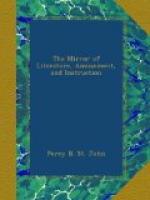Sterne pitied the man who could travel from Dan to Beersheba, and say all “was barren:” however delighted travellers or tourists may be on their journey, it is surprising how few details are preserved in their memory. This occasioned Dr. Johnson to remark, in his “Tour to the Hebrides,” how much the lapse even “of a few hours takes from the certainty of knowledge, and the distinctness of imagery;” and that “those who trust to memory what cannot be safely trusted but to the eye, must tell by guess, what a few hours before they had known with certainty.” We were never more convinced of the importance of these observations than after our first visit to the dock-yard, at Portsmouth. In collating some little memoranda made on the spot, we referred to our party, (seven in number) on our return to the inn, for the extent of the dock-yard: not one of them could give a correct answer, though all had just heard it detailed and explained with accuracy. Dr. Kitchener may well recommend tourists to walk about with note-books in their hands! and such inadvertence as the preceding almost warrants the oddity of his suggestion.
* * * * *
MOTTOES FOR DECANTER LABELS.
Arridet PORTus? subeat non causa doloris.
SumebatiS HERI? non dolor est hodie.
Hic liquor est molLIS BONus, aptus ad omnia laeta.
Oppida ne CALCA VALLAta ad praelia, quoerens, Sisonitum capias ecce tibi est Volupe.
Dum lucet CLARE Te magis iste trahat.
Literary Gazette.
* * * * *
MALARIA.
Dr. Gregory, father of the late celebrated professor in Edinburgh, when a student in a part of Germany where malaria prevailed, from being a philosopher and living low, drinking only water, was seized with intermittent fever, when his jolly companions, who ate and drank freely, escaped. If brandy or other stimulants are taken previous to exposure to malaria, intermittent fever is generally prevented. Such are the opinions of the doctor, and if Dr. Macculloch be right, we suggest the establishment of a brandy vault at each angle of the parks, that every passenger may prepare himself.
* * * * *
LORD HOWE
When the late Lord Howe was a captain, a lieutenant, not remarkable for courage or presence of mind in dangers (common fame had brought some imputation upon his character) ran to the great cabin and informed his commander that the ship was on fire near the gun-room. Soon after this he returned exclaiming, “You need not be afraid as the fire is extinguished.” “Afraid!” replied Captain H. a little nettled, “how does a man feel, Sir, when he is afraid? I need not ask how he looks.”




